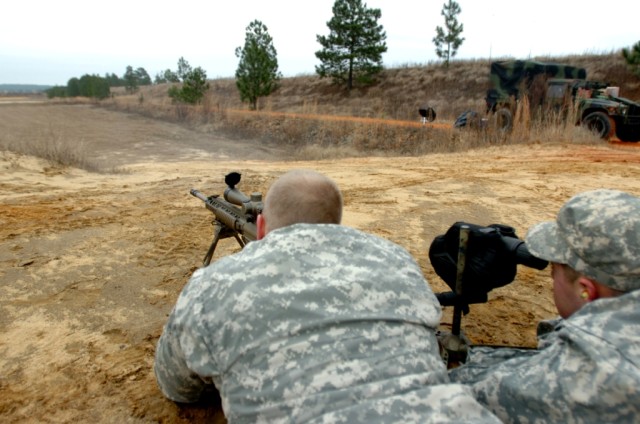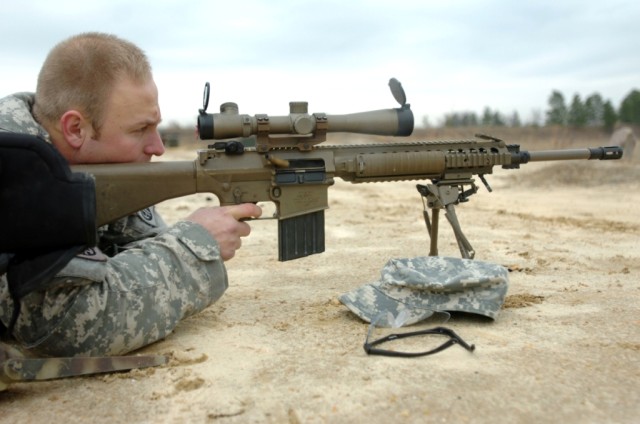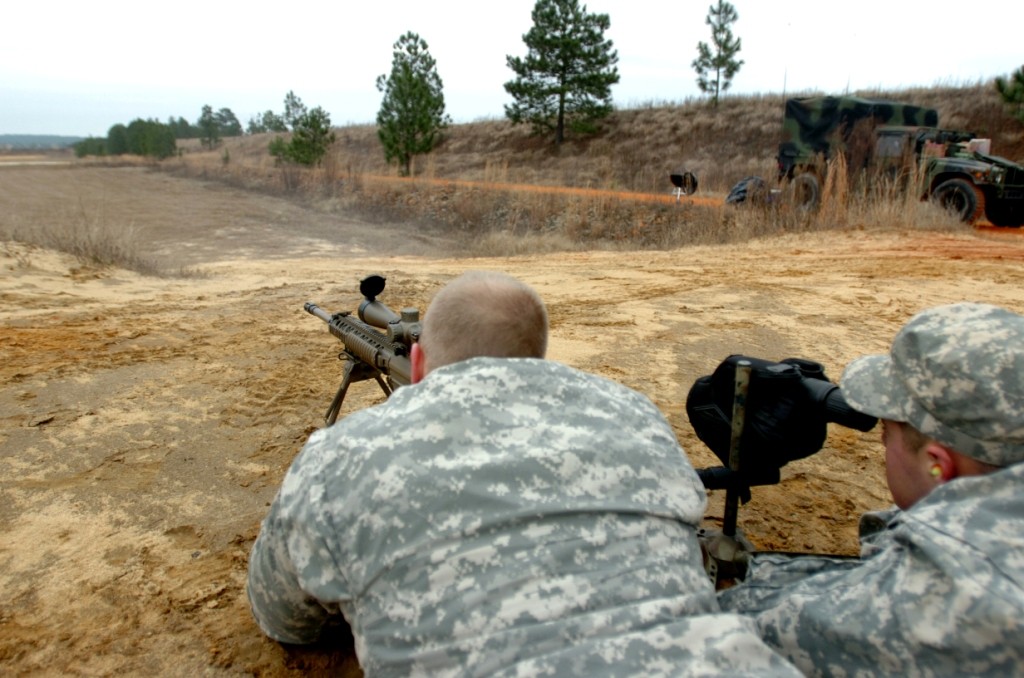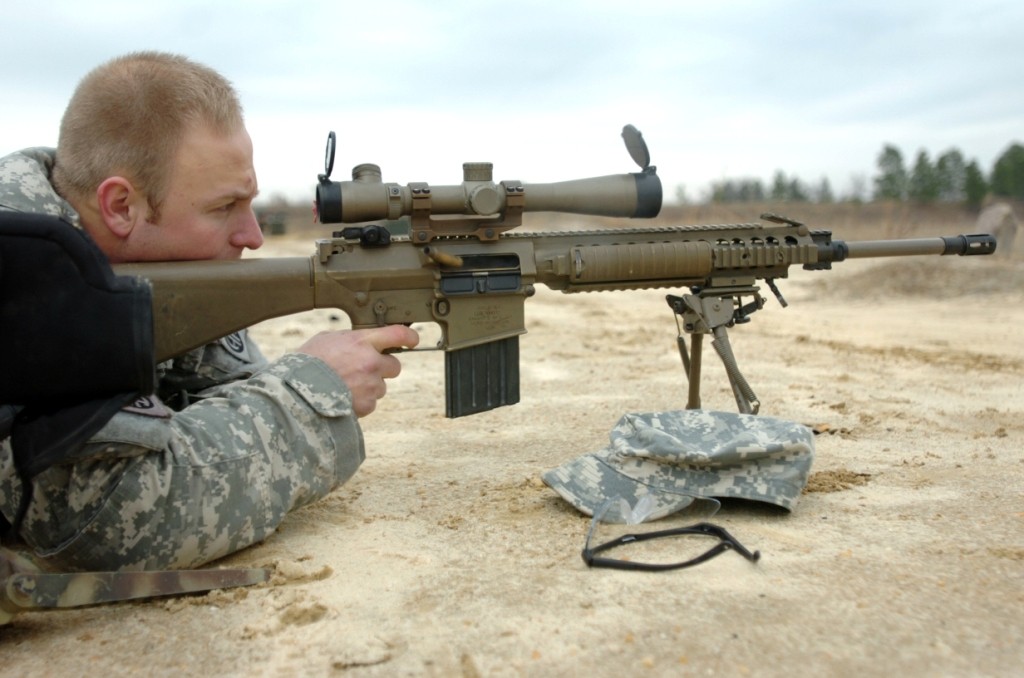Fort Bragg, N.C.- The sniper flexed his finger in the cold air.
"I can't feel my finger," he said.
"Three minutes left, one minute down," the spotter said.
Slowly, the sniper squeezed down on the trigger.
"You hit steel!" said the section leader, observing a direct hit on the two-inch "X" hundreds of meters down range.
The sniper, Spc. Jeff Mews, a Siloam Springs, Arkansas native with Troop C, 4th Squadron, 73rd Cavalry Regiment, 4th Brigade Combat Team, 82nd Airborne Division has fired countless rounds, and will fire countless more in pursuit of perfection. In the entire squadron of hundreds of Paratroopers, there are only seven snipers.
Mews had originally joined the Army with the goal of becoming a Special Forces Soldier. But when he joined a sniper team in Afghanistan he found his calling. In particular, Mews loves the camaraderie among snipers, he said.
"We work with the same seven guys day in and day out," Mews said. "You know your team better than your own family. You spend more time with them than your family."
If nothing else, being a sniper is a very physically and mentally demanding job. Snipers need to be self-reliant because they often operate without the same kind of supporting security elements as maneuver platoons, said Sgt. Tyler Juden, the section leader.
Juden, who hails from Arkansas City, Kansas has been a sniper for nearly three years, and served with the squadron's sniper section in Afghanistan.
"Everything we needed we carried on our backs," Juden said. "Whether we were in an over watch for two hours or waiting for a high-priority target for five or six days on a mountain top."
The unit's snipers sometimes carried more than one hundred pounds of gear, Juden said.
The snipers work in two-man teams, with one spotter and one shooter. Each sniper must have an encyclopedic knowledge of marksmanship. He must take into account the direction and speed of the wind, the distance of the target and the different elevations of the target and the shooter. The spotter is theoretically the more experienced sniper, accounting for all of the environmental conditions so that the shooter can concentrate on the fundamentals of marksmanship; steady position, breath control, aim, and trigger squeeze.
"The spotter gets the shooter to where the shooter just has to squeeze the trigger," explained Spc. Neil Lynch.
Lynch, who was born in Worcester, Mass., and raised in Palmdale, California is new to the sniper section, but grew up hunting and has been around firearms since his stepfather taught him how to use a shotgun when he was eight years old, he said.
"I always wanted to join since I was a kid," Lynch said. "I remember playing with G.I Joes. I thought that being a Soldier was the best thing an American man can do."
Lynch deployed with the unit to Afghanistan and reenlisted to go to the U.S. Army Sniper School, but even then he had to go through a selection process to get into the sniper section.
Before being selected for the sniper section, each of the Paratroopers had to go through a physical fitness test, a marksmanship test, a written test, and an interview.
Mews considers it a privilege to be part of such a small and specialized team, and it motivates him to train harder, he said.
"We hold ourselves to a higher standard," Mews said. "None of us were assigned to the sniper section; we were all selected."
"It takes a very special person to be a sniper," Juden said. "I think you have to be a very emotionally stable person. You really have to believe in what you're doing, so that when the time comes to squeeze the trigger you won't hesitate."
Juden's experiences there have made him confident that snipers have an important place in modern warfare, and that even a seven-man organization can be an important asset to a unit with hundreds of Paratroopers, he said.
"A lot of people think that snipers are obsolete because of unmanned aerial vehicles and other aerial observation methods," Juden said. "But there's nothing like a two-man team of highly trained reconnaissance Soldiers who can make decisions and react to situations."
Juden participated in a wide variety of operations in Afghanistan, doing everything from guarding meetings with local leaders to setting up temporary observation points for gathering intelligence.
"In Afghanistan we were used a lot," Juden said. "We would be dropped off by a maneuver platoon and then march several kilometers to our firing position."
Juden recalls one particularly memorable operation in November 2007.
Forward Operating Base Wilderness in Afghanistan's Khyber Pass was getting attacked almost daily by indirect fire. A Taliban mortar team was sneaking up to the area around the base to launch the attacks.
"Once it was determined what direction the mortar fire was coming from, we did a map recon to determine the most likely avenues of approach (used by the enemy)" Juden said. The sniper team set up and waited for the enemy mortar men.
Needless to say, FOB Wilderness was not bothered by that mortar team again.
-30-




Social Sharing